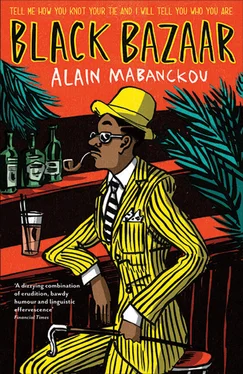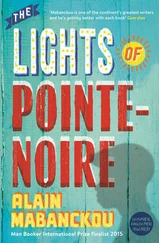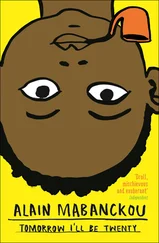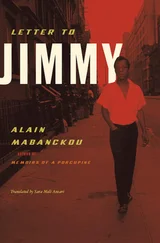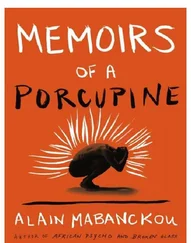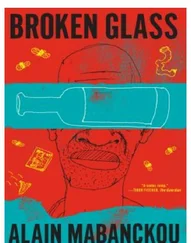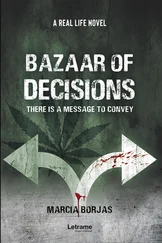“Mr Hippocratic is desperate, he’s the kind of person who only wants to hold your hand, but he doesn’t know how to go about it, especially with you. Try to reassure him, to make a friend you can talk to. Remember he’s a brother in colour, even if he doesn’t know it …”
My pals from Jip’sknow how prudent I am when it comes to money. I only spend what I’ve got and I don’t covet other people’s possessions. I don’t want to owe anything to anyone. I refuse to be tempted by our consumer society. So I don’t like loans, whether we’re talking simple or compound repayments or by instalment, I don’t like credit cards with payments either deferred or not, I don’t like overdrafts that pretend they only cost you cents when the more cents stacked up by the banker the more the debt piles up. Cents are a bit like the yeast that makes the dough rise. Behind these loans, behind these cards and these overdrafts there are always shady schemes even if the banker has the friendliest smile in the world and suggests you pop over to the café right opposite his bank’s cashpoint. When a professional invites you to join him for a coffee like that, it’s so he can have you by the short and afro-curlies. It’s not expensive, the café opposite a financial institution, but you’re still the one who pays for it in the end. The thing about yeast is that you can’t see when it makes the dough rise, you wake up one morning and it’s already spilling over the edges. They add on interest for this and that to the coffee you drank on a day you can’t even remember any more, a coffee that wasn’t even black and that was served up in something as small as a Coca-Cola bottle-top …
Deferred repayments? Overdrafts? I know what’s inside those scalding hot cooking pots and how it all turns out. The men and women who end up paying off the whole debt are few and far between. Or why would the banks push us into placing the rope around our necks instead of them staking all that money on the stock exchange and leaving us alone in our poverty?
I’ve rumbled their business model: nowadays, poverty has become the best investment for a financial institution, there’s no point in buying apartments and putting tenants inside any more, you’ve got to invest in poverty. Soon you’ll be able to buy shares in it on the Paris Stock Exchange, and the shareholders, including the small investors, will make a killing …
I pay my taxes on time because I don’t want the bailiffs turning up at my door with a sinister-looking locksmith. There’s nothing worse than an ill-timed visit from these people with their long faces who proceed to itemise your hi-fi, your old typewriter bought from a second-hand shop in Porte de Vincennes, your electric toothbrush and your Italian cafetière.
Did I say bailiffs? Their grey suits get up my nose, I’m sure they always wear the same one. Their thick glasses try my patience, I get the feeling they can stare right into my body, and that they can part my bones to see if I’m hiding a secret stash of money between my growth plates. As for the injunction letters, they stop you from sleeping at night because you can never understand them even if you read them a hundred times with the latest Code of Civil Procedure right in front of you. There’s always a last minute article or a subtle qualification, the upshot of which is to make you pay the call-out fee for the sinister-looking locksmith as well as the administrative costs of the bailiff in the grey suit that gets up your nose …
In short, I am a man whose generosity knows no limits. Original Colour didn’t understand this. I give money to the beggars who sit in front of the mosque at Château Rouge. Why them? Well, because I prefer them to the beggars who wear me out in the métro because you have to wonder if they aren’t laying it on a bit thick. The beggars in the métro are aggressive, they accuse you of being responsible for their misfortune and they think you owe them something. Some of them even go right ahead and insult you.
I came across one on Line 4. He was as old as the prophets in the Old Testament who used to live for longer than we do. It was as if he’d been following me for several stops. Was it because I was well dressed or because I looked like I was a pushover? Maybe. Maybe not. In any case I slipped him a few coins because he told me he hadn’t eaten for four days and four and a half nights. I was happy to have done a good deed. I felt light-hearted and I held it against the other passengers for not smiling at him because a smile is the key to life after all, as our Arab on the corner likes to point out.
When the métro stopped at Etienne Marcel, the guy waved at me as he got off. He didn’t realise I was getting out at the same stop. I watched him rush into the nearest Arab on the corner’s and grab a bottle of red wine, which he started necking before my eyes. What a swindle, I thought, this guy hasn’t put my cash to good use. I won’t allow myself to be hoodwinked ever again by beggars in the métro.
So that’s why I prefer the beggars at the mosque in Château Rouge. They won’t get blind drunk like that. The eye watching Cain will prevent them. They’re not aggressive, they don’t insult anybody, they don’t ask, they wait to be given something. And when you give, there is only the beggar and Allah witnessing this heartfelt act …
* * *
I’m not a fearful person, I don’t lack courage or open-spiritedness. It’s a question of strategy: a living coward is worth more than a dead hero. This was a very sensible piece of advice given to me by my deceased uncle who had deserted the army camp during the Biafran War because he wanted to defend his humble being and die a slow death rather than for ideas that’ll be obsolete in a few years as Georges Brassens, the singer with the moustache, puts it. I’ve realised that desertion runs in my family because I too fled military service in my country of origin. Weapons and all that, it’s not my thing. In fact, when I spot a man in uniform — even the security guards at a shopping mall or for the cash machine of a local bank — I cross over to the other side, I pick up the pace and I don’t look back. I imagine World War Three is at hand, that troops are moving towards Porte de la Chapelle, that the famous Senegalese soldiers will be called to the rescue as they were in the old days. That’s why I hate war films, however brilliant the director. The last one I saw was Saving Private Ryan . Yes, it was a bit different from The Longest Day which was in black and white, but it was still a war film, there were uniforms, weapons and all that, explosives, detonations and human flesh galore and all tightly plotted, but in a proper war there’s no plot, there’s no close-ups, there’s no wide-angle shots, there’s no classic dialogue, people shoot themselves and the dead get counted so the historians from the Sorbonne and future generations won’t bicker about the exact number of victims.
One of my childhood friends who advised me to do my military service over in Angola — and even to get myself recruited as a soldier — claimed that being in the military was a cushy number because during wars the soldier has a better chance of survival than a civilian who, on top of everything else, will die without honours. But I love peace, I’d far rather die a civilian and be buried in a communal grave. Someone once recommended if you wish for peace, prepare for war. I don’t agree with him. For me the person who wishes for peace must prepare for peace, end of story, the word war is surplus to requirements. And on that subject I have a photo of Martin Luther King somewhere in my suitcases. And in that photo, the black preacher is standing in front of a picture of Gandhi …
But back in the home country they were making us go to Angola to fight the war — they tried to cover up this up by saying we were going there to do our military service, and that we needed to be ready in case our neighbours the Zairians, who are a lot more numerous than us, attacked us to steal our oil, our timber and even our Atlantic Ocean.
Читать дальше
